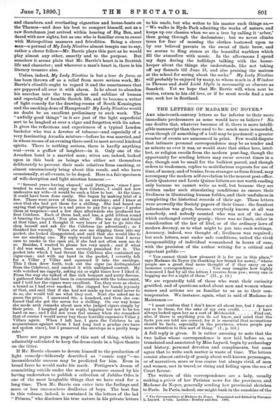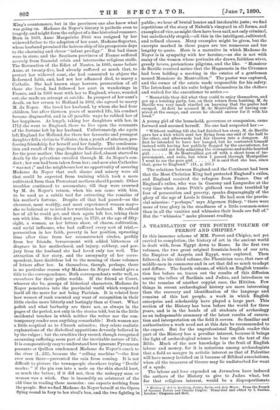THE LETTERS OF MADAME DU NOYER.*
ABE nineteenth-century letters so far inferior to their more immediate predecessors as some would have us believe? No
one doubts that, whatever becomes of it, there is more intelli- gible manuscript than there used to be : much more is recorded, even though (if something of a bull may be pardoned) a greater number of events are announced in print. Few would dispute that intimate personal correspondence may be as tender and as minute as ever it was, or would state that either love, intel- lect, or religion recoils from the modern post-bag, though the opportunity for sending letters may recur several times in a. day, though cost be small for the bulkiest parcel, and though orders to tradesmen, replies to multifarious requests for use of time, of money, and of brains, from stranger as from friend, may accompany the modern self-revelation to the nearest post-office. Louis Quatorze and Louis Quinze letters are not worth reading only because we cannot write as well, but because they are written under such stimulating conditions as ensure their liveliness in illustrating human foibles, and their usefulness in completing the historical records of their age. These letters were avowedly the Society papers of their times : the frankest information was given, because everybody known at all was somebody, and nobody counted who was not of the class which exchanged courtly gossip ; there was no limit, either in consideration of the law of libel, or of the ordinary laws of modern decency, as to what might be put into such writings.
Accuracy, indeed, was thought of ; liveliness was required ; but such letters, sent under safe conditions, united the vivid irresponsibility of individual womanhood in hours of ease, with the precision of the author writing for a critical and expectant public :—
" You cannot think how pleasant it is for me in this place," says Madame du Noyer (in thanking her friend for news), "where people are a great deal more thought of if they carry on an
immense correspondence You may imagine how highly honoured I feel by all the letters I receive from you ; every one is begging me for a sight of them." (II., p. 13.)
We are repeatedly told of those who want their curiosity gratified, and of questions asked about men and women whose
names and actions are as familiar to us as to their con- temporaries. We instance, again, what is said of Madame de
Maintenon :—
" I must confess that I don't know all about her, but I dare not say so to them, for the sake of my own credit I have always looked upon her as a sort of Melchizedek Find out,
also, if there is anything you do not know, and mind that the facts you are told are correct, for it is essential that accusations should be facts, especially in the provinces, where people pay more attention to this sort of thing." (I, p. 101.)
A full reply is given. It is rather amusing to note that the two ladies whose correspondence is now laid before us, as translated and annotated by Miss Layard, begin by archaeology and history, personal devotion and compliments, but soon agree that to write such matter is waste of time. The letters consist almost entirely of gossip about well-known personages, or of narratives, more or less coarse but always vivid, of men and women, met in travel, or rising and falling upon the sea of Court favour.
The writers of this correspondence are a lady, usually
making a précis of her Parisian news for the provinces, and Madame du Noyer, generally sending her provincial sketches to Paris. In Paris, indeed, one might bask in the sunshine of the • The Correspondence of Madame du Noyer. Translated and Edited by Florence L. Layard. 2 vols. London : Bentley and Son. 1890.
King's countenance, but in the provinces one also knew what was going on. Madame du Noyer's history is pathetic even to tragedy, and might form the subject of a fine historical romance. Born in 1663, Anne Marguerite Petit was resigned by her widowed father to the adoption of her aunt, Madame Saportas, whose husband promised the heiress-ship of his prosperous days to the charming and clever "infant prodigy." But bad times were in store, and the Southern provinces of France suffered severely from financial crisis and internecine religious strife The Revocation of the Edict of Nantes, in 1685, came before Anne, at twenty-five, had already suffered so much that, to protect her widowed aunt, she had consented to abjure the Reformed faith, and, had not her affianced died, to marry a Catholic. She had known siege horrors, persecution of all those she loved, had followed her aunt in wanderings in France, and in 1688 went with her to England, where, wearied out, she made an attempt at suicide. In prospect of her aunt's death, on her return to Holland in 1692, she agreed to marry M. du Noyer. She loved her husband, by whom she had four children, but after thirteen years of married life, his conduct became disgraceful, and in all possible ways he robbed her of her happiness. At length, taking her daughters with her, in 1712 she went to England, there to live upon the remnants of the fortune left by her husband. Unfortunately, she again left England for Holland, for there her favourite and youngest daughter fell a victim to Voltaire, then a youth of nineteen, pro- fessing friendship for herself and her family. The condemna- tion and recall of the page from the Embassy could do nothing for the poor mother. One daughter had died, almost starved to death by the privations entailed through M. du Noyer's con- duct ; her son had been taken from her; and now also Catherine "was not ;" and the neighbours lost no opportunity of assuring Madame du Noyer that such shame and misery were all that could be expected from training which took a more cultivated form than Protestant mothers should permit. Other troubles continued to accumulate, till they were crowned by M. du Noyer's return, when his son came with him, to be used as a subtle tool for extracting the remains of his mother's fortune. Despite all that had passed—as the cleverest, most worldly, and most experienced woman may— she re-believed or re-loved her worthless husband. He robbed her of all he could get, and then again left her, taking their son with him. She died next year, in 1720, at the age of fifty- eight, a woman, as her letters show, of charm, cultivation, and social influence, who had suffered every sort of trial,— persecution in her faith, poverty in her position, uprooting time after time from her reconstructed circles, perfidy from her friends, bereavement with added bitterness of disgrace in her motherhood, and injury, robbery, and per- jury from the husband she had loved only too well. The attraction of her story, and the anonymity of her corre- spondent, have doubtless led to the naming of these volumes of letters after her. In themselves, though, perhaps, there is no particular reason why Madame du Noyer should give a title to the correspondence. Both correspondents write well, as raconteurs for their polite worlds. If the friend at Court, whoever she be, gossips of historical characters, Madame du Noyer penetrates into the provincial world which respected itself all the more for not being Parisian. It is related here how women of rank resented any want of recognition in their little circles more bitterly and lastingly than at Court. What polish and what barbarity are there not, as always in the pages of the period, not only in the "stories told, but in the little incidental touches in which neither the writer nor the con- temporary reader sees anything remarkable ! Both women are a little sceptical as to Church miracles; they relate realistic explanations of the diabolical apparitions devoutly believed in by the vulgar ; but the cruelties they record, though recognised as causing suffering, seem part of the inevitable nature of life. It is comparatively easy to understand how ignorant Pyrennean peasants at Quilla,n condemned Madame du Noyer's coach to the river (I., 233), because the rolling machine "—the first ever seen there—prevented the rain from coming. It is not difficult to picture the townspeople elsewhere trying "Devils' marks : " if the pin rim into a mole on the skin should hurt, so much the better; if it did not, then the unhappy man or woman was a witch. One is insensibly an aristocrat of the old time in reading these memoirs : one expects nothing from the people. But we find Madame du Noyer herself at the Opera flying round in fury to her rival's box, and the two fighting in public; we hear of brutal hoaxes and intolerable jests ; we find repetitions of the story of Naboth's vineyard in all forms, and examples of vice, as might then have been said, not only criminal, but unbelievably stupid,—all this in the intelligent, cultivated, and refined classes. Many examples might be given, but the excerpts marked in these pages are too numerous and too lengthy to quote. Here is a narrative in which Madame du Noyer is in sympathy with her heroine,—as she is not with many of the women whose portraits she draws, faithless wives, greedy lovers, pretentious pilgrims, and the like. "Monsieur de Baville received notice that the Huguenots in the Cevennes had been holding a meeting in the estates of a gentleman named Monsieur de Montvallien " The pastor was captured, and the owner of the estate made responsible for his safety.
The Intendant and his suite lodged themselves in the chateau and waited for the executioner to arrive :—
" Meanwhile they did what they could to enjoy themselves, and got up a hunting party, but, on their return from hunting, M. de Baville was very much startled on learning that the pastor had escaped. At first he accused M. de Montvallien of having con- nived at the escape, and swore he should answer for it with his head."
A young girl of the household, governess or companion, came forward and accused herself. No one had suspected her :—
" Without waiting till she had finished her story, M. de Baville gave her a kick which sent her flying from one end of the hall to the other, and afterwards had her thrown into a dungeon. At first he intended to have her hanged, but he contented himself instead with having her publicly flogged by the executioner, for even he could not help admiring the courageous and noble-hearted girl M de Montvallien got off with a short term of im- prisonment, and exile, but when I passed through Montpellier
I went to see the poor girl It is said that she has, since that, gone to England.' (II., p. 257.) The relations between England and the Continent had been that the Most Christian King had protected England's exiles, and England received the refugees from France. One of England's exiles, who was in Gascony and Languedoc at the very time when Anne Petit's girlhood was first troubled by fear of persecution and poverty, speaks disparagingly of the glory of the age of Louis le Grand. He had seen the provin- cial miseries : "perhaps," says Algernon Sidney, "there were more of true glory in the steadiness of a little common-sense than in all the vanities and whimsies their heads are full of."
But the " whimsies " make pleasant reading.





































 Previous page
Previous page